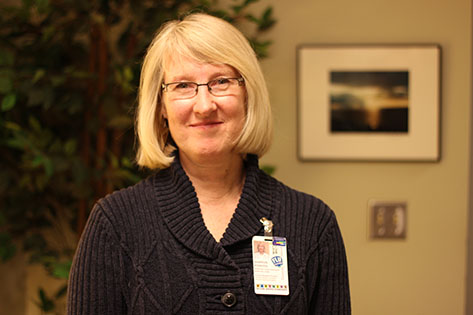
Sharon Konyen is a spiritual care provider who works with patients in the Palliative Care Unit at Princess Margaret Cancer Centre. (Photo: UHN)
For Sharon Konyen, the true impact of her work with patients in palliative care is summarized in one framed photograph that sits on a shelf in her office.
A bride and groom smile at her from the frame – a patient who was once in the Palliative Care Unit and his wife, frozen in time as newlyweds during their wedding at Princess Margaret Cancer Centre.
Konyen, a spiritual care provider at the Princess Margaret, reaches for the photo as she describes how her department is always there to listen to and support dying patients' last wishes.
"It's incredibly gratifying," she says. "With this wedding, we were able to make a difficult time in the couple's lives into something so beautiful."
The Spiritual Care Department often plays a key role in unearthing patients' last wishes through the discussions they help facilitate.
Related to this story
Talking about death
Spiritual Care's role is to support the spirit of the patient, family, and staff however they can. On the Palliative Care Unit, Konyen says, that often means exploring questions of death and dying; grief and mourning; legacy and loss.
"These aren't conversations people normally have," she admits. "But my job is to ask the questions, and if a patient wants to respond, they can. If they don't want to respond, they can reflect."
Konyen sees every patient in the Palliative Care Unit at the Princess Margaret to introduce herself and invite them into conversation. If patients are not inclined to speak at that time, she follows up at a later time to see whether they would like to engage, or to encourage them to notify her if they want to follow up.
Across UHN, spiritual care providers approach dying patients to offer a listening ear.
For Danielle Slump, the department's representative who works in the General Internal Medicine units at Toronto Western, the process is a bit different. Slump works closely with the Palliative Care Team, and since Toronto Western doesn't have its own palliative unit, she visits the patients one-by-one.
"I try to see every patient in palliative care at the Toronto Western," she says. "I'm there to support them, their families and staff who care for them on a regular basis."
Through family meetings, services of remembrance for patients who have died and opportunities for staff to process and reflect together, Slump and her colleagues aim to maintain the spirits of those who are impacted directly by a terminal diagnosis.
Helping staff help patients
Staff members are often those most in need of a spiritual care visit after the passing of a patient in palliative care.
At the Bickle Centre for Complex Continuing Care in particular, staff build long-term relationships with patients because they're often at Bickle for many years, says Klara Siber-Simic. She's a spiritual care professional who works with patients on the Palliative Care Unit at Bickle.
"Recently, when a patient passed away, many staff members said to me, 'They were a good friend,'" she explains. "I had never heard that before. But our staff get to know these people, it's important to remember that."
To help staff come to terms with the deaths they witness, the Spiritual Care Department has rolled out the Lavender Alert initiative at Princess Margaret's 14A, 14B and 14C units and Toronto Western's General Internal Medicine Units. The Lavender Alert allows staff in the process of caring for a patient who is approaching the end of their life to call Spiritual Care for a quick meeting or power-up on how to emotionally cope with the situation.
A terminal diagnosis greatly affects a patient's perspective on their life, but staff encounter this on a daily basis, says Konyen. It's important to make sure the spirits of both patients and staff are supported in the midst of these realities.
Advocates for patients
The key for spiritual care providers is to maintain a positive relationship with the patients they work with.
"By getting to know the patients, I can help advocate for them," Siber-Simic explains.
When patients have final wishes – such as the wedding Konyen so fondly remembers planning, or the desire to have a dog visit for a few hours – Spiritual Care can help the patient advocate to have them carried out.
"A person's spiritual dimension has so much more significance once they're ill and throughout that journey," she says. "It's important to have someone witness that. That's what we do."
